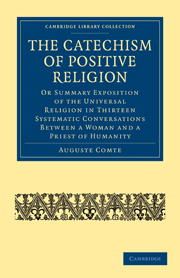 The Catechism of Positive Religion
The Catechism of Positive Religion Book contents
- Frontmatter
- PREFATORY NOTE TO THIRD EDITTON
- Contents
- PREFACE
- POSITIVIST LIBRARY
- HINT TO THE READER
- INTRODUCTION
- First Part EXPLANATION OF THE WORSHIP
- CONVERSATION III The Worship as a Whole
- CONVERSATION IV Private Worship
- CONVERSATION V Public Worship
- Second Part EXPLANATION OF THE DOCTRINE
- Third Part EXPLANATION OF THE REGIME, OR SYSTEM OF LIFE
- CONCLUSION: GENERAL HISTORY OF RELIGION
- TABLES
CONVERSATION IV - Private Worship
Published online by Cambridge University Press: 05 October 2010
- Frontmatter
- PREFATORY NOTE TO THIRD EDITTON
- Contents
- PREFACE
- POSITIVIST LIBRARY
- HINT TO THE READER
- INTRODUCTION
- First Part EXPLANATION OF THE WORSHIP
- CONVERSATION III The Worship as a Whole
- CONVERSATION IV Private Worship
- CONVERSATION V Public Worship
- Second Part EXPLANATION OF THE DOCTRINE
- Third Part EXPLANATION OF THE REGIME, OR SYSTEM OF LIFE
- CONCLUSION: GENERAL HISTORY OF RELIGION
- TABLES
Summary
The Woman.—It seems to me, my father, that private worship, as private life, must be composed of two very distinct parts, the one personal, the other domestic, the separation of which seems necessary for its explanation.
The Priest.—This natural division, which I was bound not to mix up with the main division of the worship, settles, my daughter, in truth the plan of our present conversation. Two great institutions of sociolatry, the one relating to the true guardian angels, the other to the nine social sacraments, will in it characterise respectively, first our personal, then our domestic worship. The reasons for making the latter depend on the former are, in lesser degree, essentially similar to those which represent the whole private worship as the only solid basis of the public. More inward than any other, personal worship alone can sufficiently develop firmly-rooted habits of sincere adoration, without which our domestic ceremonies, and still more our public solemnities, could have no moral efficacy. Thus sociolatry institutes, for the heart of each, a natural progression, in which individual prayers duly pave the way for the collective ceremonies, through the regular intermedium of the domestic consecrations.
The Woman.—Since the private worship is thus made the primary basis of all our religious practices, I beg you, my father, to explain to me directly its real nature.
- Type
- Chapter
- Information
- The Catechism of Positive ReligionOr Summary Exposition of the Universal Religion in Thirteen Systematic Conversations between a Woman and a Priest of Humanity, pp. 83 - 97Publisher: Cambridge University PressPrint publication year: 2009First published in: 1891


